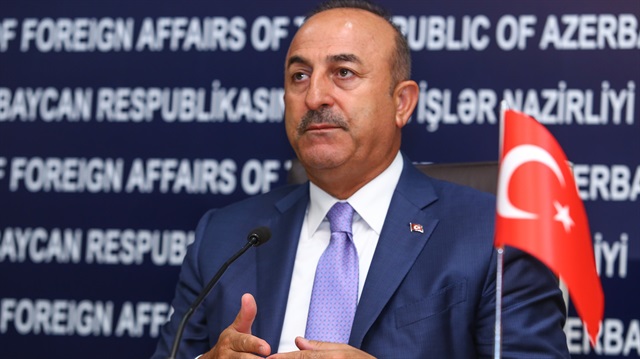
'We don't necessarily need to go along with sanctions imposed by US or UK on Iran,' says Turkish foreign minister
Turkey is not obliged to go along with sanctions imposed by the U.S. or Britain against Iran, according to Turkish foreign minister on Tuesday.
Mevlüt Çavuşoğlu made the remarks while visiting Azerbaijan’s capital Baku at a joint news conference alongside Elmar Memmedyarov, his Azerbaijani counterpart.
Highlighting that Turkey opposes U.S. sanctions on Iran, Cavusoglu said: "We go along with UN sanctions like every country, but we do not necessarily need to go along with sanctions imposed by U.S. or U.K. against Iran."
He added Turkey also does not agree with U.S. sanctions on Russia.
"We do not find those sanctions right. This is a principle stance. It does not depend on any other condition," he said.
U.S. officials met Turkish companies on July 19 and with Turkish officials of the Foreign Ministry, Treasury and Central Bank on July 20 about the issue of a new round of sanctions against Iran.
Many Turkish companies are prime trade partners with Tehran.
The U.S. announcement in May that it would unilaterally withdraw from the Iran nuclear deal and re-impose sanctions has drawn criticism worldwide.
- F-35 jet deal
About the U.S. Senate's decision to block the delivery of F-35 jet fighters to Turkey, Cavusoglu said: "The administration holds the authorization rights regarding this deal. There are no setbacks about the purchase of F-35 jets. Two of the jets have already been received and training [of Turkish pilots] continue."
American senators voted overwhelmingly to block the delivery of F-35 jet fighters to Turkey on Monday.
"The United States and any other country should understand this. You cannot get any results from Turkey by imposing sanctions or insisting. Dialogue, diplomacy and respect help getting results from Turkey," he added.
Meanwhile, President Recep Tayyip Erdogan on Tuesday dismissed reports about the U.S. Senate and Congress aiming to prohibit the transfer of advanced F-35 fighter jets to Turkey.
In reply to questions after his ruling Justice and Development (AK) Party's parliamentary group meeting in Ankara, Erdogan said: "You know the matter, it is completely at the disposal of the U.S. president once the bill passes. Mr. Trump has shown me the written statement he made during our discussion in Brussels and such a thing [prohibiting the transfer] is not in question."
- Baku-Tbilisi-Kars railway
Azerbaijan Foreign Minister Elmar Memmedyarov, who also spoke at the news conference, said the two top diplomats exchanged views on how to use Baku-Tbilisi-Kars railway "effectively".
"Afghanistan is facing difficulties in its freight train transportation. Therefore, with the Baku-Tbilisi-Kars railway, more loads can be transported along with Kazakhstan and Uzbekistan," he said.
Azerbaijan and Turkey have several joint projects, including the Baku-Tbilisi-Ceyhan Oil Pipeline, Baku-Tbilisi-Erzurum Gas Pipeline, Baku-Tbilisi-Kars Railway and Trans Anatolian Natural Gas Pipeline Project (TANAP).








